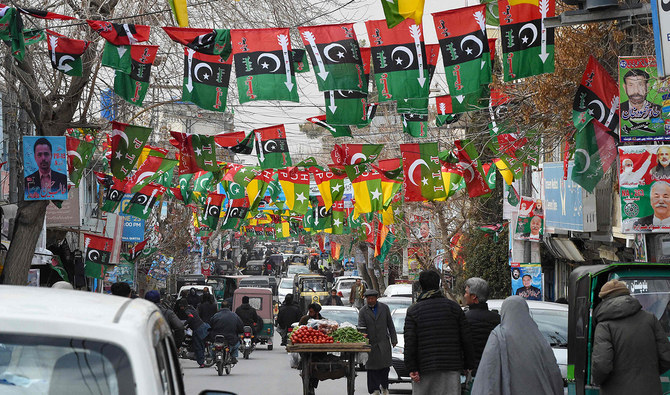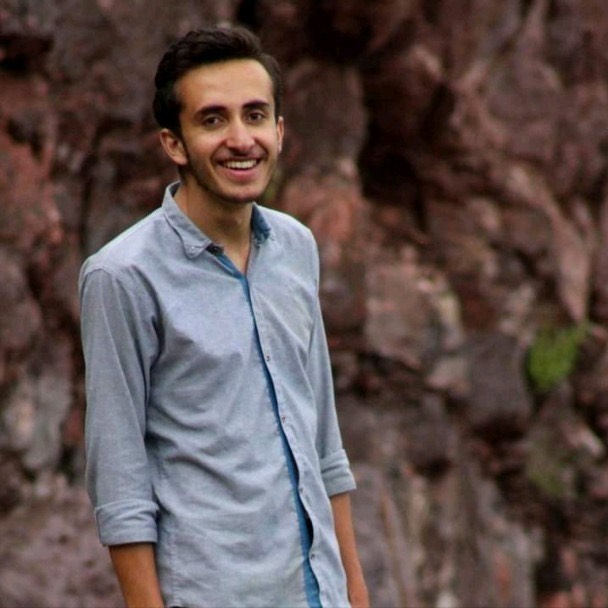The Election Promise in Pakistan: Another Round of Political Engineering
Although there is an upsurge in Imran Khan’s popularity among the masses — arguably for being the latest victim of persecution initiated by a system that fails to deliver on its promises to the people — public confidence in the election process was unsurprisingly low.

This photo taken on February 3, 2024, shows a street festooned with flags of political parties ahead of Pakistan's national elections, in Quetta. Image Credit: AFP
Pakistan’s economic forecasts are rarely optimistic. The country’s political instability is on the rise. People are protesting for essential life services. Institutions are engaging in turf wars over their prescribed constitutional roles. The Pakistani military establishment is consistently accused of having deep entrenchment in the country’s political and legal landscape. Independent reporting by news media faces a clampdown while dissenting voices are stifled by law enforcement agencies. Amid such extraordinary circumstances — although not entirely unprecedented — Pakistan held its general election on Feb. 8.
Less than a week before the elections, Pakistan’s former prime minister, Imran Khan, was convicted for three separate cases; he was already imprisoned when the convictions took place. The courts have sentenced the former premier — who now faces disqualification from running in elections — to 10 years for leaking state secrets, 14 years for retaining state gifts from the Saudi crown prince against an undervalued assessment, and 7 years for a marriage law violation deeming his marital relationship fraudulent. In the first case related to the leaked diplomatic cable, Khan is convicted for making public the contents of a cable that documented the meeting between American officials and Islamabad’s then-ambassador to the U.S., Asad Majeed. Khan had cited the conversation between officials to assert that the cable showed a U.S. effort meant to push the country’s military leadership to oust him through a no-confidence vote in parliament for maintaining neutrality in the Russia-Ukraine war. The military leadership at that time denied Khan’s accusations, citing the parliamentary procedure of ousting him as impartial and the result of Khan’s failed governance during his time in office (2018-2022).
This is not the first time the Pakistani military establishment is accused of playing an outsized role in the country’s politics. In fact, the security establishment’s institutional efforts were crucial in bringing Imran Khan’s Pakistan Tehreek-e-Insaf (PTI) party to the national political stage against the two traditional political parties — Pakistan People’s Party (PPP) and Pakistan Muslim League, Nawaz (PML-N) — which were in power (2008-13 and 2013-18, respectively) before Khan entered the country’s highest executive office. When in power, Khan was charged with using military backing to crush his political opposition through massive criminal proceedings, politically motivated incarcerations, and multiple disqualifications of opponents sanctioned by the country’s top courts, who wield little independent power against the security establishment’s overwhelming influence in domestic politics. Khan was deemed as the military’s darling when he would proudly declare being on the “same page” with the country’s generals — until tensions grew with the military institution over Khan’s ouster.
The PML-N and PPP, the other two major parties that contested the national elections, have again sought political power at Khan’s expense as the military has cornered the former premier from the electoral process. Since his ousting and imprisonment, Khan’s political party has fractured into smaller fractions; the party’s leadership has either denounced Khan’s tussle with the generals or faced imprisonment, convictions and exclusion from elections. The political transformation has reinforced the need for the military’s approval for politicians to make a political comeback, as the leadership of PML-N and PPP did after facing the military’s animosity during Khan’s tenure. While “favorites” of the security establishment keep on changing, the role of the military’s top brass in the country’s political system and policy issues remains prevalent.
Pakistan’s hybrid politics — with military generals wielding enormous influence on the country’s policy stances — is ensured by the lack of democratic culture among political parties who constantly appeal for greater power share at the expense of democratic consolidation and civilian supremacy. The country’s judiciary, almost always siding with political entities out of the military’s favor, further undermines the democratic spirit of constitutionalism and rule of law. Along with the judiciary’s partial role against civilian leaders in Pakistan’s constitutional history, the censorship of critical news outlets and persecution of dissenting journalists raises questions about the legitimacy of elections — including those that took place on Feb. 8.
As the country’s top institutions, political elites, and separate organs of the state vie for greater influence on the national stage, ordinary people at the other end of the power spectrum are the most serious victims of a political system that fails to deliver on its promise of effective governance. With rising inflationary pressures, spiraling levels of unemployment, depleting foreign reserves, and plummeting standards of living, the public is too occupied confronting daily hardships to focus much on the intra-elite struggles of power-sharing, constitutional excesses, and institutional overreach. Although there is an upsurge in Imran Khan’s popularity among the masses — arguably for being the latest victim of persecution initiated by a system that fails to deliver on its promises to the people — public confidence in the election process was unsurprisingly low.
Khan’s PTI, without any surprise, was not allowed a level playing field: the leadership is imprisoned; many of its members are in hiding; some party stalwarts have deserted; the party was not allowed to contest elections with the traditional party symbol (a cricket bat); and multiple cases are being heard on the party’s conduct after Khan’s falling out with the military. In contrast, the PML-N and PPP conducted their electoral campaigns more freely. However, their electoral ambitions were hindered by the popular perception that they have been tried and tested more than once. Consequently, a low voter turnout was expected on election day.
No matter the outcome, the elections unfortunately do not promise an easy escape from the political turmoil and economic crisis that Pakistan faces. The democratic prospects that elections should offer — the election of a popular leadership with the authority to govern without the control and influence of unelected “king-makers” — seem to be a distant dream for Pakistan. The recent developments have prolonged the military establishment’s grip on the country’s politics, with no major party having any plan (or perhaps even intent) to curtail the dominant role of the military in policymaking. The controlled and limited spectrum of debate in the election process exhibits the postponement of the advent of full democracy. Hence, political power in Pakistan is likely to flow through the barrel of the gun — unsurprisingly and indefinitely.

Humayun Javed is a first-year graduate student in the International Relations Program. He is a Fulbright Scholar from Pakistan whose research focuses on U.S. foreign policy, identity politics in South Asia, and theories of International Relations. His work, titled “Authoritarian Populism and Response to COVID-19: A Comparative Study of the United States, India, and Brazil,” has been published in the Journal of Public Affairs. Further, his published works include: “State of Indian Democracy and US-India Strategic Cooperation: An Uneasy Convergence?” in Strategic Studies and “Authoritative Populism and the Media: Perception Control and Narrative Building in India” in the Journal of Contemporary Studies.








